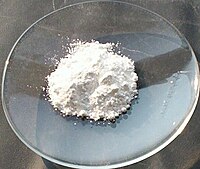
Photo from wikipedia
Zinc deposition and dissolution is a significant process in zinc-based batteries. During this process, the formation of zinc dendrites is pervasive, which leads to the loss of efficiency and capacity… Click to show full abstract
Zinc deposition and dissolution is a significant process in zinc-based batteries. During this process, the formation of zinc dendrites is pervasive, which leads to the loss of efficiency and capacity of batteries. The continually growing dendrites will finally pierce the separator and cause the batteries to short circuit. Thus, employing effective methods to inhibit the formation and growth of zinc dendrites is vital for the practical application of zinc-based batteries. This Minireview first clarifies the formation and growth principles of zinc dendrites. Then, the research and development of methods to solve the problem of zinc dendrites are reviewed, including ways to suppress the further formation and growth of dendrites as far as possible, to minimize the adverse effects of dendrites, along with ways to produce dendrite-free deposition processes. The mechanisms, advantages, drawbacks, and perspectives of these methods are illustrated. Thus, this overview of these methods will aid understanding of the formation process of zinc dendrites and provide an extensive, comprehensive, and professional reference to resolve the problem of zinc dendrites completely.
Journal Title: ChemSusChem
Year Published: 2018
Link to full text (if available)
Share on Social Media: Sign Up to like & get
recommendations!